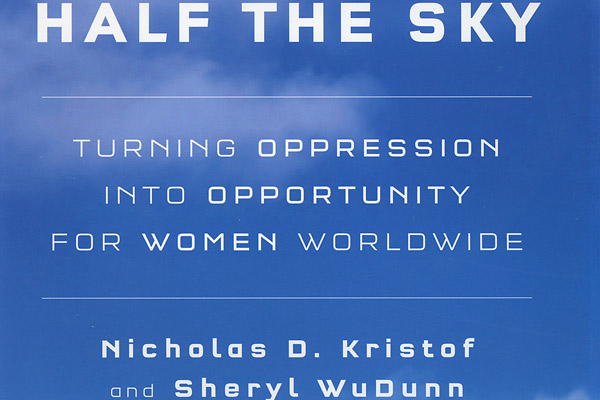
Nicholas Kristof and Cheryl WuDunn's Half the Sky: Turning Oppression into Opportunity for Women Worldwide.
The aid and development world likes to deal in simple certainties. Africans are starving (1985)? Feed the world. Communism has failed (1989)? Privatize the world. A new mantra that has found wide acceptance in recent years runs something like this: Your country is still poor? You’re probably sexist.
The idea is that developing world traditions often marginalize and abuse women, and that this isn’t just unfair, it’s unintelligent. Women take their responsibility as home-makers more seriously than men, so the thinking goes, and are more hard-working, more trustworthy, less violent, less drunk – and therefore the key to any nation’s economic progress. It’s argument that finds its fullest expression in the book Half the Sky: Turning Oppression into Opportunity for Women Worldwide by the Pulitzer Prize-winning New York Times journalist Nicholas Kristof and Sheryl WuDunn, released last year. It’s an idea for which there is plenty of evidence: notwithstanding numerous matriarchal traditions in poorer parts of Asia and Africa, custom and, in the Muslim world, religion evidently does hold women back in much of the developing world. Economics successes such as China, where communism emancipated women long ago, or the Grameen Bank in Bangladesh, which made its microloans mainly to women, prove those attitudes don’t just belong with the dinosaurs, they’re dumb too. Only natural, then, that this is an argument adopted at the highest levels in the West. In South Africa this week, First Lady Michelle Obama focused on meeting young women, urging a congregation of them in Soweto to be “the generation that brings opportunity and prosperity to forgotten corners of the world.”
The conviction on Friday of a woman – and a former government minister at that – for genocide and rape during the 1994 Rwanda genocide may help nuance the idea that all a poor country needs to do to progress is empower women. The International Criminal Tribunal for Rwanda (ICTR) in Arusha, Tanzania, sentenced Pauline Nyiramasuhuko, 65, and her son to life in prison after convicting her on a total of 11 charges relating to atrocities committed in Rwanda’s southern Butare region, including genocide, crimes against humanity, extermination, rape and persecution. The tribunal allowed the rape charge on the grounds that Nyiramasuhuko, a Hutu and the then families minister, knew her subordinates were raping Tutsi women and failed to take measures to prevent or punish them.
Freddy Mutanguha, Rwandan Country Director for the Aegis Trust, a genocide prevention organisation, told Reuters it was “shocking that this mother and former social worker, trained to protect life, could instead have been responsible for such appalling crimes.” But is it? Perhaps more shocking is the notion that someone’s gender is the chief determinant of their behavior. Two years ago I interviewed Ellen Johnson-Sirleaf of Liberia at her offices in Monrovia and when, inevitably, I asked her about becoming Africa’s first woman President, she groaned: “Oh dear, the woman question again!” Johnson-Sirleaf did then dutifully trot out some platitudes about how women made better leaders. But her tone made clear she felt they were – to use a phrase – disempowering, as if she were merely a cipher and her accomplishments, among them rescuing a country from civil war, had little to do with her but were almost entirely due to her sex.
To exclude women from an economy is illogical. To argue they hold the solution to poverty or poor leadership is naive. To claim their secret is their sex is, by definition, sexist. Development and progress, economic or social, are extraordinarily complicated. Simple answers, as Nyiramasuhuko’s conviction should remind us, are simple-minded.

